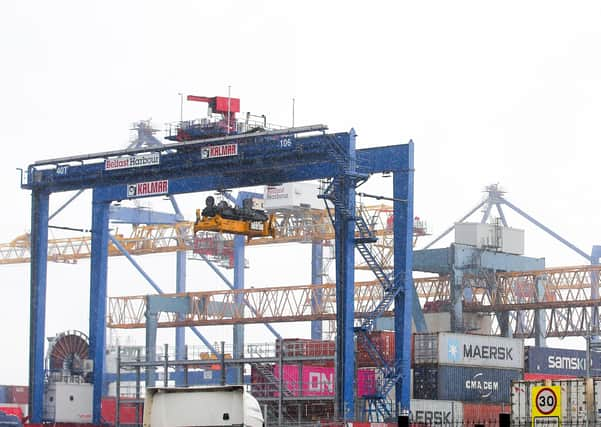Reorienting Northern Ireland’s economy towards the EU will be costly, warn economists


An academic article which analyses how the trade in goods is impacted by the new internal UK trade frontier shows that Northern Ireland buys more goods from the UK than from Republic of Ireland, the EU and the rest of the world combined.
The trade in services – such as legal work and accountancy – is not covered by the Northern Ireland Protocol but is a smaller percentage of the economy.
Advertisement
Hide AdAdvertisement
Hide AdThe article, by Ulster University’s senior economist Edmond Birnie and Queen’s University senior lecturer in economics Graham Brownlow, said that economically Northern Ireland is now “a hybrid combining GB as well as EU features”.
Last night Stormont civil servants who had been carrying out border checks at Larne and Belfast ports had still not returned to work, despite the chief constable saying that there was no credible threat against them.
Yesterday Cabinet Office minister Michael Gove admitted that the NI Protocol which his government negotiated with Brussels is “not working at the moment” with the result being “disruptions and difficulties faced by Northern Ireland citizens in their daily lives”.
However, Mr Gove did nothing to suggest that he is even considering – as many unionists hope – to scrap the entirety of the protocol, instead saying that problems “can be resolved within the context of the protocol, we don’t need to ditch it in order to resolve those issues”.
Advertisement
Hide AdAdvertisement
Hide AdDr Birnie and Dr Brownlow’s article for the Economics Observatory said: “Optimists argue that the NI economy will eventually be buoyed up by having the best of both worlds: ‘unfettered access’ to the GB market while still being part of the EU’s single market.
“This becomes less likely to the extent that persistent frictions GB-to-NI lead to higher costs associated with the new regulatory environment.”
The sets out how Northern Ireland sells £10.6 billion in goods each year to GB while buying £13.4 billion from GB. That means that the fettering of trade into Northern Ireland is more significant in economic terms than the continued free flow of goods in the opposite direction.
The authors said: “Northern Ireland’s most important trading partner is Great Britain. As we consider any frictions for those trading between NI and GB – the so-called ‘border in the Irish Sea’ – it is notable that in 2018, NI sales to GB were about two and half times greater than those to Ireland.
Advertisement
Hide AdAdvertisement
Hide Ad“In terms of purchases and imports, the flow from GB to NI was more than four times greater than the flow between Ireland and Northern Ireland.”
They accepted that “in the long term, some cost disadvantages could be mitigated through shifting supply chains from GB to Ireland or the rest of the EU (although such shifts could be costly)”, but added that there are other difficulties from the protocol: “The region has become a rule-taker: it must apply EU rules but has minimal input into the formation of such regulations.”
The government has claimed that Northern Ireland would benefit from trade deals with non-EU countries, but the authors questioned if that was realistic, saying: “If the UK government does succeed in striking a series of post-Brexit free trade agreements, will NI be able to enjoy the benefits?
“It seems likely that the United States, for example, will make any deal conditional on very strong rights of access for US food products. Such access would fly in the face of NI’s application of EU SPS standards.
Advertisement
Hide AdAdvertisement
Hide Ad“The United States may end up making a free trade agreement with GB rather than the entire UK.”
Last week the SDLP’s Matthew O’Toole said it was wrong to refer to the protocol creating an ‘economic United Ireland’.
He said that “Brexit means that in all areas not in the Protocol – and that includes fundamental areas – the north/south economies will diverge”.
Mr O’Toole, a former civil servant in the Treasury and Downing Street before entering politics as MLA for South Belfast, said there is “a huge list of areas” which the protocol does not cover and on which the UK-EU trade deal is either silent or will lead to “a huge retrenchment”, including in services.
Advertisement
Hide AdAdvertisement
Hide AdThat meant that in areas such as banking all-island banks are diverging, reversing some of the simplifications to cross-border trade which have been possible over recent years.
READ MORE:
Advertisement
Hide AdAdvertisement
Hide AdAdvertisement
Hide AdAdvertisement
Hide Ad——— ———
A message from the Editor:
Thank you for reading this story on our website. While I have your attention, I also have an important request to make of you.
With the coronavirus lockdown having a major impact on many of our advertisers — and consequently the revenue we receive — we are more reliant than ever on you taking out a digital subscription.
Subscribe to newsletter.co.uk and enjoy unlimited access to the best Northern Ireland and UK news and information online and on our app. With a digital subscription, you can read more than 5 articles, see fewer ads, enjoy faster load times, and get access to exclusive newsletters and content. Visit https://www.newsletter.co.uk/subscriptions now to sign up.
Advertisement
Hide AdAdvertisement
Hide AdOur journalism costs money and we rely on advertising, print and digital revenues to help to support them. By supporting us, we are able to support you in providing trusted, fact-checked content for this website.
Alistair Bushe
Editor